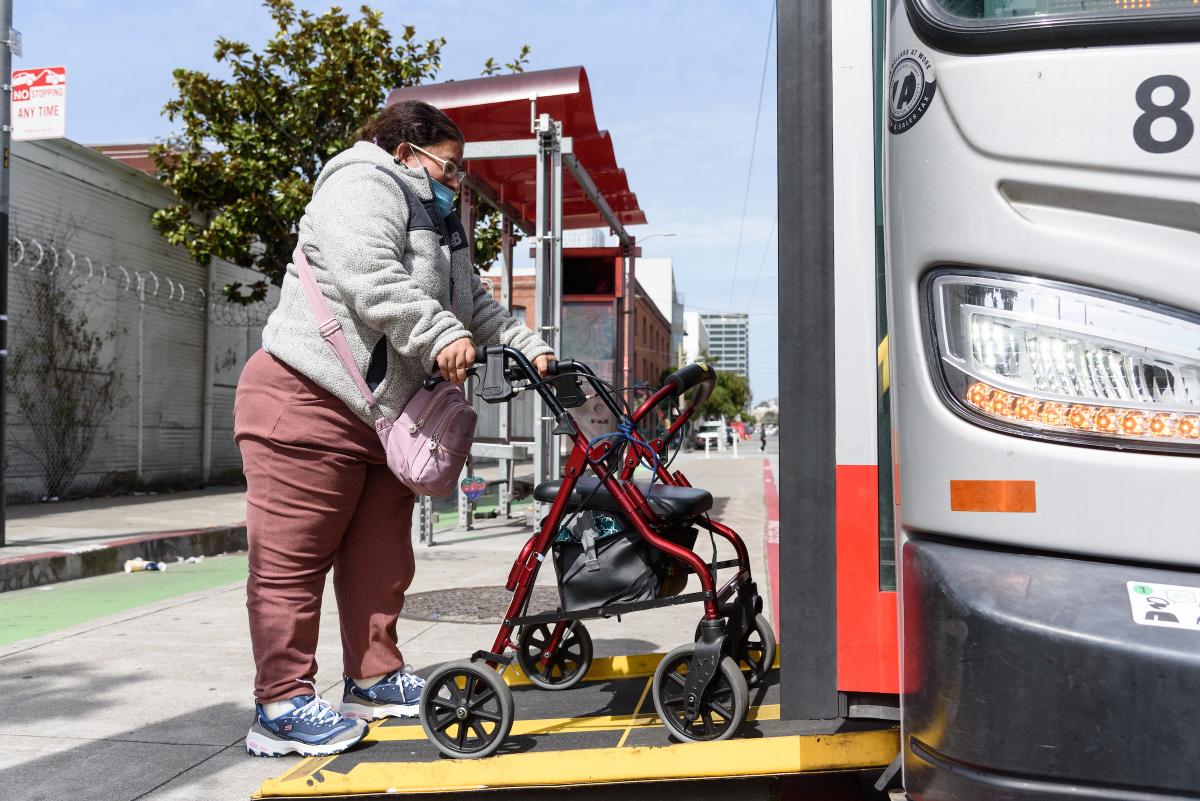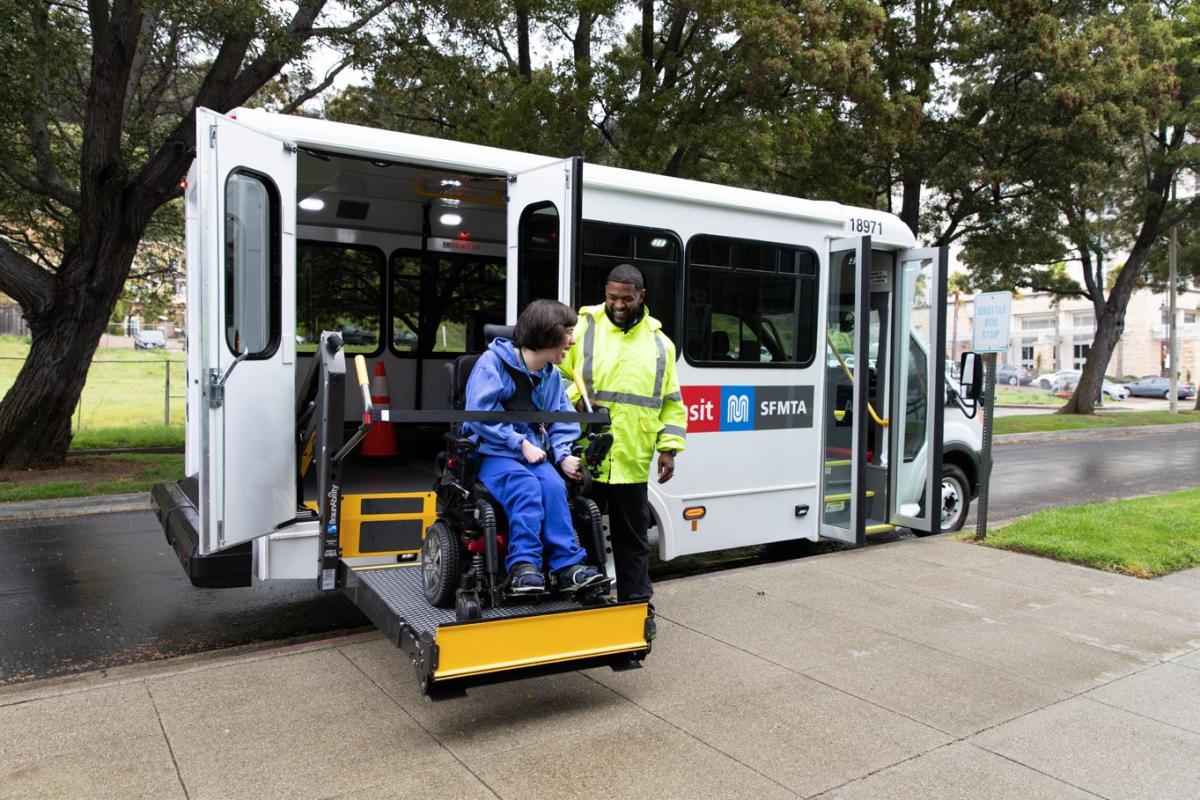
We're always working to make our system more accessible – learn how a recent survey will help us address key needs.
More than 1,300 people responded to our recent Accessibility Needs Survey. It’s a key part of our work to make our system more accessible for everyone. And the results will help us understand and act on the community’s top accessibility priorities.
We prioritized accessible outreach from the start and heard from a diverse group of San Francisco residents. Learn more about who responded – and what community members shared with us.
Starting with accessible outreach: How we heard from 1,300 people
Accessibility is one of our core values at the SFMTA, and we are working hard to make our system accessible for everybody. This is especially critical as one in four San Francisco residents is either 65 or older or has a disability.
To hear from as many community members as possible, our teams:
- Produced the survey:
- In online and print formats
- In six languages: English, Spanish, Russian, Chinese, Filipino/Tagalog and Vietnamese
- Promoted the survey:
- On bus ads, print ads and digital platforms with a QR code
- At in-person events, including farmer’s markets and First Thursday events
- Through a staff-led workshop series for monolingual Chinese speakers
We ran the survey for four months and received 1,379 responses!
Among the diverse group of survey takers:
- 64% identify as having a disability
- 36% are 65 years or older
- 34% speak a language other than English
- 29% make under $50,000/year
The big picture: What we heard
Across all responses, a few key priorities stood out for accessible transportation:
- Quick improvements
People prefer changes that make travel safer and easier right away. Examples include increasing crossing times and adding quick physical improvements like paint, street signs and traffic markers that guide drivers.
- Affordable fares
Survey takers rely on free and discounted fares on Muni, paratransit and taxis. These options help them move around San Francisco.
-
Reliability
Reliable transportation is a top priority for customers with accessibility needs. They expressed the need for clean and working elevators and escalators. We know both support accessible travel, so we manage a website riders can check as they plan their trips. The Muni Metro Elevator Status webpage provides real-time elevator accessibility status. Customers can also sign up for alerts to know when there's an elevator status change.They also highlighted the need for frequent Muni service. In this area, we’re making great progress with our Muni Forward program. An in-depth report shows Muni Forward projects have reduced travel times by up to 35% and resulted in up to 51% more reliable transit service.
- Flexible Paratransit
Respondents pointed out the need for programs like paratransit taxis and the Essential Trip Card. These programs provide same-day reservations. Customers would also like to be able to book paratransit trips with multiple stops.

A top priority for survey takers: longer crossing times at intersections with signals. Learn how our current policy helps to address this.
Deep dive: Key priorities across our system
Streets
Survey takers ranked the following as the top priorities for our city's streets:
-
Quick safety improvements
Results showed a strong preference for fast, effective safety projects.Our Vision Zero Quick-Build Program is an example of this work. Quick-Build projects are reversible, adjustable traffic safety improvements that can be installed within weeks or months We’ve completed 40 Quick-Build projects throughout San Francisco. On streets where we’ve installed Quick Builds, crashes involving pedestrians are down 32% and crashes involving bikes are down 33%.
- Accessible pedestrian signals and crossing times
It was important to respondents that we deliver on our commitment to increasing crossing times at all intersections that have signals. Survey takers also want us to increase the number of Accessible Pedestrian Signals (APS) across the city. These are pedestrian push buttons that communicate when to cross the street in a non-visual manner. They can feature audible tones, speech messages and vibrating surfaces.
Our policy is in line with this top priority. We install these buttons at all new traffic signals and at intersections that are undergoing a major signal upgrade. We also place them at locations requested by the public when funding is available. Our latest data shows we have Accessible Pedestrian Signals in place for at least 40% of city intersections with signals. That's a total of 520 intersections.
- Inclusive planning
Many responses pointed out that inclusive planning for street projects requires easy to access outreach and communication. This means choosing meeting places and times that work for everyone, especially people with disabilities and those with low incomes. Responses also mentioned that inclusive planning means sharing project information in clear and easy-to-understand formats.
Our outreach work for upcoming Muni service changes is a great example. To hear from community members about our proposed service plan, teams put up 600+ signs in nine languages. They also held four in-person pop-up events and hosted a feedback form online in four languages.
We also heard how important curb ramps and accessible sidewalks are to move easily around the city. This feedback emphasizes the need for the SFMTA to keep working with our peers at San Francisco Public Works. This way, we can help make sure the city's sidewalks and curb ramps are safe, clean and accessible for everyone.

Riders told us they value a range of accessible vehicle features on Muni, including priority seating.
Muni
Muni moves us all. We are always working to make sure it is accessible to everyone. The top accessibility priorities for Muni were:
- Affordable Muni fares
The survey results highlight the need to keep Muni affordable with programs like Free Muni and the RTC Discount ID Card.
- Accessible vehicle features
We heard that accessible features on our vehicles are very important to community members. Examples include priority seating for people with disabilities and older adults. Survey takers also mentioned that features like designated stroller areas on our buses are valuable. They help make sure we have room for everyone on board.
- Reliable elevators and escalators
Respondents also rated the reliability of elevators and escalators as a very high priority. It is very important to riders that elevators are working, and that they are clean enough to feel safe and comfortable. Our Castro Station Accessibility Improvements Project is an example of our work to meet this need.
Taxis
Survey takers emphasized the need for better taxi access for everyone. They called for more accessible taxi stands near curb ramps with extra space for loading. Many respondents also emphasized the need for more ramp taxis that accommodate wheelchair users.

Our paratransit programs provided half a million trips in the last fiscal year. We’re proud of this progress and always partnering with communities to make improvements.
Paratransit
The highest rated priorities for paratransit were:
- Same-Day Reservations/Chained Trips
Riders prioritize paratransit services that go beyond the basic requirements of the Americans with Disabilities Act (ADA). In the survey, they emphasized the importance of continuing programs like paratransit taxi and the Essential Trip Card program. These options make travel more convenient with a same-day reservation option. Survey takers also would like the flexibility to make several stops on a trip when needed.
- More effective travel training and Improved Enrollment Processes
Riders also requested clearer guidance around their paratransit options. They expressed the need for more effective travel training. They also want to see a smoother enrollment process, especially when seeking multiple services.
- Fare assistance
Our survey results show that affordability is top of mind for most paratransit riders. We heard the importance of making sure someone’s income does not limit their mobility.
For more information on current paratransit services, visit the Paratransit webpage, or contact our Mobility Management Center. You also can learn more about our mobility management programs in the "Mobility for Everyone" episode of our Taken with Transportation podcast.
How we got here
For decades, our agency has worked to meet and go beyond the requirements of the Americans with Disabilities Act (ADA) and other regulations.
This Accessibility Needs Survey built on the Needs Assessment. The assessment summarized the many years of accessibility work we've done. It also highlighted accessibility needs we can focus on to keep improving access for people with disabilities and older adults. We wanted to hear feedback on these needs before developing actions to address them.
Knowing the top priorities of our customers will help keep us focused on the most important needs. This is very important while we are facing short and medium-term funding challenges. To learn more about how we are working to bridge our budget gap, you can visit the Muni Funding Work Group webpage.
Even as we face funding challenges, we are proud to make consistent progress improving accessibility. We now see:
- 98.7% on-time performance for paratransit vans
- 92% customer satisfaction across all paratransit programs
- 200 Muni stops become more accessible for seniors and people with disabilities

We value your feedback and hope you’ll continue to share ideas as we advance our Accessibility Strategy.
Next steps: How to stay involved
We hear your priorities for transportation to be safe and convenient. We’re working to make transportation in San Francisco easier to use, keep it affordable and ensure it is reliable for everyone.
We will be developing goals and actions to address the highest priority needs identified in the survey. Community feedback will continue to be very important in this process. Recently, we held focus groups for seniors, members of the disability community and caregivers to better understand how we can address their specific needs. We also held separate groups for Spanish and Chinese speakers to provide language support.
We will share information about upcoming events and opportunities to get involved soon. We will post these updates on the Accessibility Strategy project page.
Email us at AccessibilityStrategy@SFMTA.com to ask a question, provide input or let us know that you are interested in project updates. You can also share feedback and ask questions by calling our Accessible Services team at 415.646.2260.
Comments are for the English version of this page.